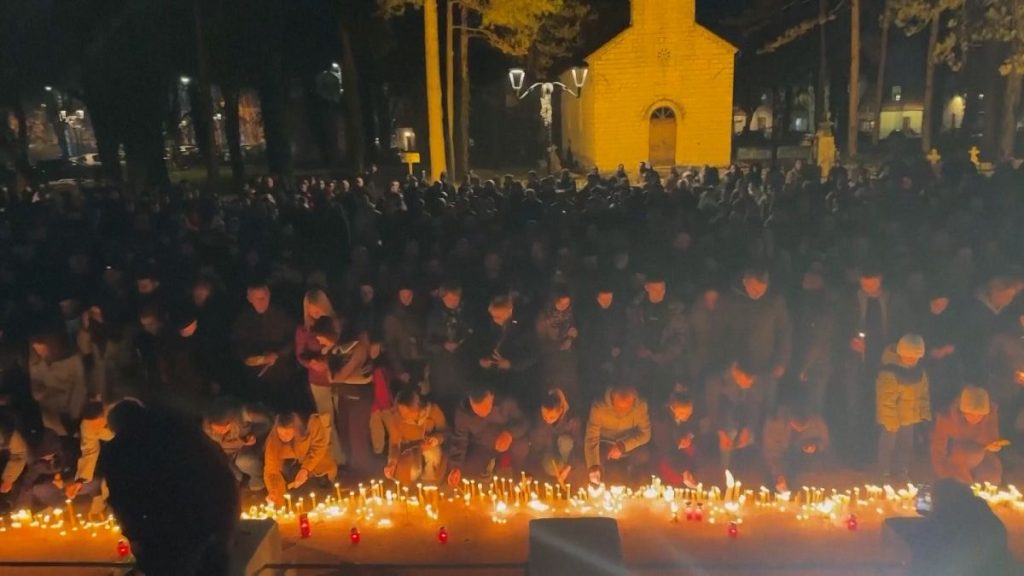The tranquil mountain town of Cetinje, Montenegro, was shattered by an unprecedented act of violence on Wednesday, August 12, 2022, when a 45-year-old man, identified as Aco Martinović, embarked on a shooting rampage that claimed the lives of twelve individuals, including himself, and left at least four others wounded. The incident, sparked by an altercation at a local bar, rapidly escalated into a horrific tragedy, leaving the small Montenegrin community reeling in shock and grief. Martinović’s actions, driven by what authorities believe to be a family dispute, transformed a seemingly ordinary day into one of the darkest in Cetinje’s recent history. The incident underscored the devastating consequences of readily accessible firearms combined with unresolved personal conflicts.
The tragic events unfolded after a reported quarrel at a bar in Cetinje, a historic town nestled in the rugged Montenegrin mountains. Martinović, reportedly embroiled in a dispute with the bar owner, initiated the violence by fatally shooting the proprietor and his two children. The attack quickly spiraled outwards from the bar, engulfing the surrounding area as Martinović continued his rampage, targeting other patrons and individuals he encountered. The victims included not only bar patrons but also members of Martinović’s own family, indicating a complex and deeply rooted conflict that ultimately culminated in this horrific act of violence. The chaotic scene left the town in a state of panic and disbelief as residents grappled with the sudden eruption of violence in their typically peaceful community.
As the situation unfolded, law enforcement agencies swiftly responded to the unfolding crisis. Police officers converged on the scene, engaging in a tense standoff with the shooter as they attempted to contain the violence and apprehend the perpetrator. Martinović, having inflicted widespread carnage, attempted to evade capture by fleeing the immediate area. However, his efforts to escape proved futile as he was eventually located by pursuing officers. Confronted by the authorities, Martinović ultimately took his own life, adding a final, tragic chapter to the already horrific narrative. The incident marked a grim turning point for Cetinje, casting a long shadow over the town and its residents.
The Cetinje shooting sent shockwaves throughout Montenegro, a small Balkan nation with a relatively low rate of violent crime. The scale and brutality of the attack were unprecedented in the country’s recent history, leaving citizens grappling with the implications of such an event occurring in their own communities. The incident sparked widespread public mourning and national introspection, as the nation sought to understand the motivations behind the violence and address the underlying issues that contributed to this tragic outcome. The government declared three days of national mourning, reflecting the profound impact of the tragedy on the entire nation.
The Cetinje shooting resonated far beyond Montenegro’s borders, drawing international attention and condemnation. World leaders and international organizations expressed their condolences and solidarity with the victims and their families, highlighting the global concern over gun violence and its devastating consequences. The incident served as a stark reminder of the pervasive nature of such tragedies, which transcend national boundaries and underscore the need for comprehensive strategies to address the root causes of violence. The international community offered support and assistance to Montenegro as it navigated the aftermath of the shooting and sought to implement measures to prevent future tragedies.
This tragic event was not an isolated incident in Cetinje’s recent history. Disturbingly, this marked the second mass shooting in the town within a three-year period, raising serious questions about the accessibility of firearms and the effectiveness of existing gun control measures. The recurrence of such violence within such a short timeframe underscored the urgent need for a thorough examination of the underlying factors contributing to these incidents. The government faced mounting pressure to review and strengthen gun control legislation, implement preventative measures, and address the societal challenges that contribute to violent behavior. The Cetinje shooting served as a sobering reminder of the ongoing need for vigilance and proactive measures to ensure the safety and security of communities, both within Montenegro and globally.














